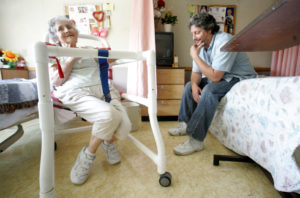By Victor Greto
It was the first time I’d ever done such a thing, so I hesitated.
But my mother – in bed one late spring morning in the nursing home where she had lived for a year and a half – couldn’t feed herself.
I watched my hand as it spooned up the candy-colored mush prepared for her.
She had to have her food pureed because the home had lost her dentures a couple of weeks earlier, and the dentist inexplicably needed another month to make her a new set.
Mom hated pureed food, and also had begun to avoid drinking. So much so, that she had been hospitalized for four days the week before for dehydration.
After her return from the hospital, she remained weak, stubborn, angry.

For the past few days, she’d been telling me how she didn’t want this to continue.
I put the food into her mouth. Her jaw clamped on the plastic spoon. Her eyes looked up at me, hints of shame around their edges.
She swallowed, grimaced, keeping her eyes fixed on me.
Mom’s moods rose and fell with a strange regularity: from a petulant despair to an insatiable hunger, to be alive and to eat salty food.
Some days, she’ll be closing her eyes contentedly while eating chocolate ice cream or spaghetti and meatballs; the next day she’ll be up and saying, “I’m determined not to give in to them today.”
Replying to an aide who offered her two choices for lunch, Mom told her, “Which one will kill me first?”
Yet another time, this perfect embodiment of working-class Catholic spirituality would tell me, “You know what I’m going to tell God, and not ask him?”
“What?”
“’You’ve got a lot of nerve.’”
Yet another reflection of the toll that Parkinson’s disease has wreaked upon her for the past 15 years, before which she exercised regularly, walked for miles and ate sparingly.
“I did everything right and this is what I get,” she told me during the time we lived together. “I don’t deserve this.”
The first time I spoon-fed my mother was the climax of a nearly six-year role-reversal, when I first returned home after being away for more than two decades to help care for her.
Back then, I’d brought a girlfriend with me. She lasted three years in the same house with my mother before their – and our – relationship grew toxic. We had thought we’d be caring for Mom a year, perhaps two at the outside.
Nevertheless, the three of us living together became impossible. I learned more about the depths of my mother’s powerfully cutting and unforgiving personality over the next couple of years than I had before I left home more than two decades before.
One night while I was at work, my girlfriend called to tell me Mom refused to thank her for making dinner and would not speak to her.
She handed the phone to my mom.
“What’s going on?” I asked her.
“Oh, Victor,” Mom said in a chilling, uncompromising tone. “I don’t know what to say.”
Neither did I.
I took over her care full-time, until, nearly two years later, I put her in the nursing home because she kept falling.
In a sense, then, spoon-feeding Mom was just one more thing to do to keep an old woman with Parkinson’s disease alive so she could enjoy what remained of her life.
But it was something else again in relation to me.
I’ve reached a point in my life where experience invariably feeds into perspective, something that being middle-aged seems to prepare one for.
A lot of the things I experience now become more about learning stuff about myself that I never knew, or didn’t want to face.
The girlfriend-Mom thing taught me more about both my girlfriend and my mother than most other things ever could.
But spoon-feeding my mother pointed to a lesson of a different kind.
I have been relatively successful at both career and relationships – short-term, that is. I’ve never gone hungry or worried too much about monthly bills; nor have I bemoaned, for too long, a lack of companionship.
But, unlike those of most of my brothers, neither careers nor women proved to be permanent.
Here’s a telling incident, which also took place not too long after I spoon-fed Mom: A female Florida cousin asked me after another break-up of mine – my best friend and long-married brothers call them “previous administrations” – whether I was capable of finding a woman who could, or would, put up with me.
I laughed, of course, as did she. But, like so many things I laugh at, it bothered me afterward. My cousin’s remark, however, pointed in the wrong direction.
For me, love has been as hard to swallow as pureed food.
I think this is less about a fear of commitment – the great bogeyman that women perennially throw at me and a lot of guys I know – as it is about a fear of contentment.
Because there is a great deal of unfinished business in most of our lives. Most of this business is emotional, and much of that concerns our childhoods, getting over outsized slights, petty grievances and impossible situations.
For me, it’s getting over the irrational circumstances in which my father’s schizophrenia placed my mother, my five brothers and myself. It helps explain my mother’s benign neglect of us, even my brothers’ incessant teasing.
Every couple of years my father’s illness would shatter what I soon considered to be an untrustworthy normalcy.
I took all the habits I formed at that time – withdrawing, anger and helplessness at behavior I could not grasp, and a general feeling that no one could ever come close to understanding me – and consistently applied them to my adult situations.
The result has been both temporary career choices and fleeting relationships; even the best of times – even the best of people – are tempered by preparations for the worst, the inevitable earthquake.
I think the problem with the women in my life centers on this issue, as much as it feasts on my galling idiosyncrasies or annoying habits.
But, feeding the woman who once did the same for me four decades before, down to the delicate act of dabbing her mouth clean, may have been the right incantatory combination of experiences that has exorcised it once and for all.
As I continued to feed Mom, I thought, looking at both the clarity and pain of her eyes: This is what love is, in all its down-and-dirty reality.
If love proved to be finally enough here, after all the pain and regret of childhood, perhaps it may elsewhere, too.
